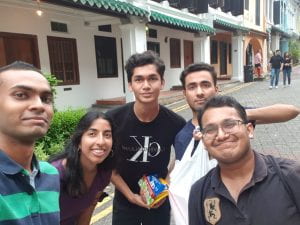Imposter syndrome. You might have heard of this phrase before; perhaps, you already know it all too well. According to a medically reviewed definition of imposter syndrome, it is ‘the internal psychological experience of feeling like a phoney in some area of your life’, despite any achievements you have had in that field (Source). Does this feeling sound familiar? It is likely that you or your peers have had an experience of imposter syndrome before – how then does one overcome this troubling feeling that seems to nag at you constantly? In this article, we have invited a few students to share their personal experiences with imposter syndrome, and how they have tried to overcome it. Curious? Read on!
Yong Xin shares about facing imposter syndrome upon taking up a leadership role
Hello, my name is Yong Xin! I am a Year 2 student majoring in PPE (Philosophy, Politics, Economics) and I currently reside at the College of Alice and Peter Tan (CAPT).
“Do I really deserve this?”
“Isn’t there someone who is better than me at this?”
“Am I really good enough?”
Many of us have had such questions run through our minds before. No matter what stage of life we are in or how much experience we accumulate, the temptation of comparing ourselves to others remains strong.
Towards the end of my first year in university, I was elected as the Director of the Social Innovation Wing in CAPT’s College Students’ Committee. Although this was not the first leadership role I’ve taken up, it was still challenging to adjust to the new roles and responsibilities. I recall that when I first stepped into this position, there were many times when I battled with feelings of inadequacy. I often wondered if I obtained my achievements through luck, and I consistently felt that it was only a matter of time before people found out that I wasn’t as good as I seemed. Furthermore, living on campus meant that I was constantly surrounded by my high-achieving peers who seemed to balance their work, academics and social life effortlessly. It was so easy to think that someone else was more competent or more suited to being in my position than I was.
It is one thing to recognise the signs of imposter syndrome, such as my recognition of those feelings of inadequacy that I had felt upon taking up the role of a Director. But how do we go about managing such feelings?
Firstly, reach out to those around you. While we often feel alienated in our struggles, we are never truly alone in facing them. One great thing about campus living is that so many people around you have faced similar situations as well. Sharing my experiences with my friends really helps me navigate through my insecurities, and I’m beyond grateful for this support system I have.
Featuring my lovely vice directors of the Social Innovation Wing who have supported me greatly in my leadership journey.
We should also recognise that we are all bound to make mistakes. However, a fumble does not equate to failure. Learning to practise self-compassion was crucial in my own journey of overcoming imposter syndrome. While I am much more mindful of how I respond to my faults, I am still trying to be less critical of myself. After all, how well you sail a ship is shown during a storm, not in calm waters!
Finally, (as cheesy as it sounds), believe in yourself! There is no point in wondering if you are the best person for this job. The only thing that truly matters is whether you strive to be the best that you can be.
Stand tall and trust yourself.
Saatvik on the fine line between imposter syndrome, being an international student and self-development
Saatvik (right) and his NUS College friends
Hey, everyone! I am Saatvik Agrawal, a Y1 Engineering Science student staying in Cinnamon College under NUS College (NUSC).
Imposter syndrome, to me, is a common and often debilitating experience. It is a manifestation of internalised self-doubt, often leading to anxiety and burnout. This syndrome can affect anyone – it is not limited to individuals with lower self-esteem. The high-pressure environment of NUS, combined with the constant comparison to others, can cause feelings of inadequacy, fear of being discovered as a fraud or not measuring up to the standards of others.
I believe that imposter syndrome is a natural outcome of one’s mindset and environment. This understanding allows us to see imposter syndrome as a feature of life, not a bug. Any of us and our peers may experience it at some point in our lives.
Knowing that I can learn whatever I don’t know yet, has proven to be a good strategy in situations that require me to project confidence. For example, in group projects, even if I am not fully familiar with all aspects of the project, I try to steady myself and be open to picking up foreign concepts along the way. This facilitates better cooperation among group members. It has also bought me time to gather information and make decisions, especially when faced with a complex or unfamiliar situation, instead of letting myself spiral. Note that it is still important to be transparent – if I am unsure about something, I would ultimately still acknowledge it and seek advice, rather than risk making a mistake or misleading others.
The pressure to conform to societal norms can also lead to feelings of impostor syndrome. When we strive to be seen as acceptable to our peers, we may feel the need to change ourselves to fit in. The fear of being discovered as a fraud or not measuring up to the standards of others can lead to feelings of self-doubt and anxiety. I have found that adopting a self-compassionate approach helps, such as by treating oneself with kindness. This can be achieved by embracing our authentic selves, reframing negative self-talk, practising self-care, and seeking help when needed!
As an international student in NUSC, I have come to realise that imposter syndrome is reflected in my choices and experiences while staying on campus. For instance, I fret over tasks that most of my local peers do not have to worry about, such as buying and getting items from home. I feel like an ‘imposter’ amidst others who are able to go about campus life with such ostensible ease. Furthermore, the language barrier fuels my imposter syndrome, as English is not my mother tongue. In social settings, I often feel self-conscious due to my limited language skills. This feeling of not belonging can be overwhelming and makes it difficult for me to fully immerse myself in the college experience.
I have learnt to circumvent the overwhelming feeling of comparison by embracing diversity. By recognizing the diversity of experiences and perspectives, I have realised that everyone brings unique strengths and skills to the table. Talking to a variety of people has also helped me understand that everyone experiences imposter syndrome in some way, and that I am not alone in this.
In 2022, I participated in events organised by Yale-NUS College – they were very memorable, and were surprisingly effective in combating imposter syndrome. I particularly enjoyed the hands-on activities such as creating my tote bag, tie-dying and watching the ballroom dancing showcase. The ballroom dancing showcase extended my interest in theatre engineering as I was able to learn about the technical aspects of the performance and how it was executed. Participating in such events has been a valuable tool in helping me feel more confident, overcome some social anxiety and experience campus life more deeply.
Chrysalis Hackers and Makers 3D modelling workshop that Saatvik (centre, back) co-organised with another friend in Cinnamon College
To end with an artsy message: The torment of imposter syndrome can be a formidable force, never ceasing to hound in every moment. But to unravel its mysteries and harness its power, one must delve deep within and embrace the journey. And so, I discovered the beauty in failure, the gemstones of growth that lay hidden within its rough exterior, and the harmonious embrace of a community that uplifts at NUS and NUSC.
Ashleigh’s gradual process of dealing with imposter syndrome
Hi! I am Ashleigh Gan, a Y2 student studying Psychology, and I currently live in Tembusu College. My experience with imposter syndrome has pretty much lasted my entire schooling life, and I am happy to share about it with you.
In the academic context, especially at the beginning of my educational journey, I wasn’t exactly the brightest of the bunch. I didn’t really know what was going on in school, and I didn’t understand what studying even was. I’m blessed to have a mother who doesn’t harp too much on getting good grades, but back then I really think that I could have benefitted from some kind of help. As I got older, I slowly learned from my friends and teachers how to go about things and I started to work a lot harder, finally feeling like I understood my own ability and where I stood amongst my peers.
However, this change did not come without its repercussions. The more I understood about my standing in class and in school, the more overwhelmed I would feel, desperately trying to break out of my old shell of (for lack of a better word) stupidity. I’d put in the work and won one or two academic awards, but it still didn’t change a thing about the way I perceived myself. It didn’t help much that I had just barely scraped my way into an elite school, where every other person was a scholar, and it felt like everyone around me was just better. It felt like the moment I made a mistake, everyone’s perception of me would change to match the one I had of myself: stupid.
These days I would like to think that I’ve overcome those feelings of inadequacy and taught myself that each small step is progress worth celebrating. This practice ensures that I do not discount any effort that I’ve put in, because I’ve already acknowledged it to myself. My advice to anyone dealing with imposter syndrome is to remember where you started, and tell yourself that without your own agency to actively make the choice to continue, and to work hard, you wouldn’t be where you are now. It might be hard to believe in these things at first, but the more you repeat it to yourself, the more you’ll be convinced of it.
Did you enjoy reading these stories? We hope that you have learnt some important things about imposter syndrome, an issue that is perhaps more prevalent than it seems to be. Do remember to talk to someone you trust, or seek help if you face any mental health issues – you are not alone. Here is a link to NUS’s student counselling services: Services. Remember to be kind to yourself, and look out for signs of imposter syndrome amongst your peers as well. If you have any stories or tips about combating imposter syndrome, do share them on Instagram and tag us @nusresidentiallife – we will be sure to repost your valuable insights!




